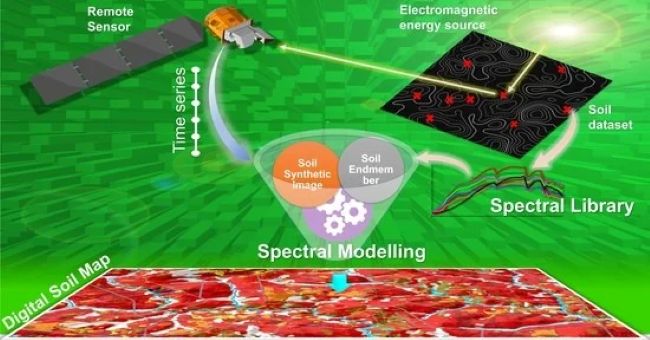(3 Minutes Read)
One year after its inception, the Regional Hub for Fertiliser and Soil Health for West Africa and the Sahel is preparing to launch a suite of advanced digital soil mapping tools and agronomic solutions aimed at transforming smallholder agriculture, halting soil degradation, and strengthening climate-resilient food systems across the region.
The Hub, which operates from its headquarters at the International Institute of Tropical Agriculture (IITA) in Ibadan, Nigeria, was conceived as a direct outcome of the 2023 Lomé High-Level Roundtable on Fertilisers and Soil Health. It was officially inaugurated at the 2024 Africa Fertiliser and Soil Health Summit in Nairobi, signalling a bold and united regional push to tackle deteriorating soil fertility and promote sustainable agricultural growth.
According to Bernard Vanlauwe, IITA’s Deputy Director General for Research and Chair of the Hub’s Steering Committee, the state of Africa’s soils is nothing short of a crisis. He noted that nearly 80% of cultivated land in the region suffers from degradation, which leads to massive nutrient losses and causes estimated economic damage of around USD 4 billion annually. This erosion of soil health underpins poor agricultural yields, widespread food insecurity, and persistent rural poverty.
In many parts of West Africa and the Sahel, smallholder farmers typically apply fertilisers without access to soil diagnostics or knowledge of their land’s unique nutrient requirements. This “one-size-fits-all” approach often results in underwhelming harvests, inefficient use of inputs, and ecological harm. The Hub’s upcoming high-resolution digital soil maps are intended to change this paradigm by offering data-driven, site-specific soil insights.
These state-of-the-art soil maps are being developed using a combination of field-level soil analysis, geospatial imaging, and data modelling. They will empower farmers to adopt the “4R Nutrient Stewardship” principles—applying the right fertiliser source, at the Right rate, at the Right time, and in the Right place. This approach is expected to significantly improve fertiliser efficiency, enhance yields, reduce environmental damage, and facilitate the adoption of climate-smart farming techniques.
“Through the introduction of digital tools like these soil maps, the Hub is helping to lay a solid foundation for agricultural systems that are not only productive but also sustainable and resilient to climate shocks,” said Vanlauwe. “Our goal is not simply higher crop outputs—though we anticipate yield gains of up to 40%—but also a healthier ecosystem and stronger rural livelihoods.”
Supporting this digital shift is AgWise, an open-source agronomic advisory platform designed to be climate-aware and farmer-focused. AgWise integrates multiple data sources—such as weather forecasts, soil profiles, satellite imagery, and market trends—to offer customised, real-time guidance on everything from fertiliser usage and crop choice to optimal planting windows and field management practices.
Beyond digital advisory tools, the Hub is also investing in soil and plant testing laboratories, the formulation of regionally-appropriate fertiliser blends, and the use of predictive data analytics to guide soil management strategies. These actions align with broader continental and regional policy frameworks such as the ECOWAS Fertiliser and Soil Health Roadmap, the African Union’s 10-Year Soil Health Action Plan, and the Nairobi Declaration on Soil Health and Fertiliser Use.
The initiative’s success is underpinned by a broad coalition of influential partners, each contributing critical expertise:
- IITA: Leads research efforts and hosts the Hub.
- OCP Africa: Supplies tailored fertiliser solutions suited to local soils.
- African Plant Nutrition Institute (APNI): Provides training and conducts applied soil science research.
- International Fertiliser Development Center (IFDC): Advocates for efficient fertiliser use and fosters public-private partnerships.
- Mohammed VI Polytechnic University (UM6P): Supports precision agriculture through soil mapping and satellite technologies.
- AICCRA (Accelerating the Impact of CGIAR Climate Research for Africa): Offers policy support and technical capacity.
- ECOWAS: Ensures political coordination and alignment across member states.
Looking ahead, the Hub has set ambitious targets. By 2033, it aims to:
- Restore and improve soil health on 1.5 million hectares of farmland,
- Increase productivity and earnings for over 3 million smallholder farmers, and
- Help at least 1.5 million farmers better manage climate-related risks.
Read Also;
https://trendsnafrica.com/a-new-era-in-agriculture-brazils-embrapa-partners-with-africa/
The first batch of digital soil health maps is slated for release in 2025, marking the beginning of what could be a transformative era for agriculture in the region. With science and technology at the forefront, the initiative represents a move toward a more intelligent, collaborative, and sustainable future for African farming.
As Vanlauwe put it, “This initiative is about much more than soil. It’s a critical pathway to achieving food security, stimulating economic growth, and empowering our farmers with the tools they need to succeed in a rapidly changing climate.”





